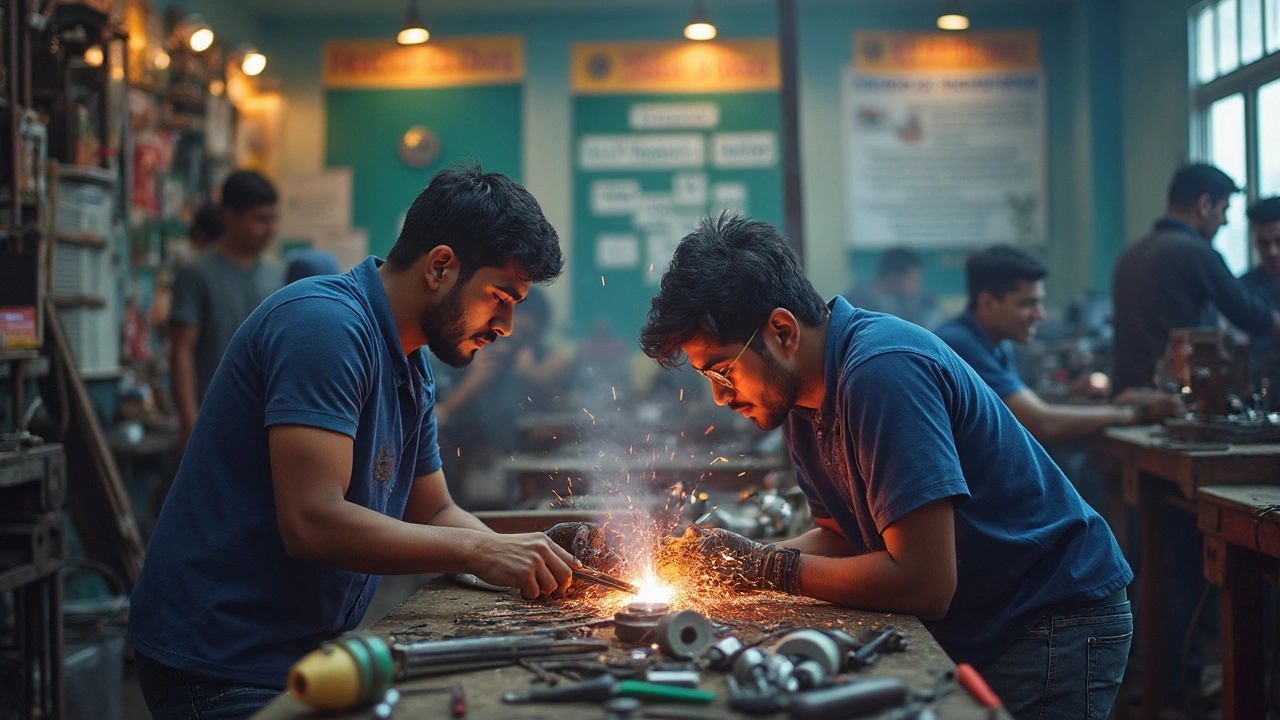So, what's the deal with diploma courses in India? Let's break it down in simple terms. A diploma course is like a golden shortcut to hands-on skills and job-ready training without the long-term commitment of degree programs. These courses usually span from six months to three years, depending on the field and your gusto to dive deep.
Think of diplomas as these practical gateways that focus on providing specialized knowledge and skills directly linked to specific industries. People often choose them when they want a direct ticket to the workforce or a leg-up in their current career. And here's a nifty fact: they're super diverse in terms of subjects—a bit like picking flavors at an ice cream parlor. From technical fields like engineering and computer applications to creative realms like fashion design and culinary arts, there's a diploma for pretty much every interest.
- What is a Diploma Level Course?
- Why Choose a Diploma?
- Popular Diploma Fields in India
- Duration and Structure
- Eligibility Criteria
- Tips for Choosing the Right Diploma Course
What is a Diploma Level Course?
In India's bustling education scene, diploma courses are like focused sprints compared to the marathon-like degree programs. They're designed to get you industry-ready, usually without the fuss and time commitment of a full-fledged degree. Think of them as a no-nonsense approach to diving right into the practical and hands-on stuff.
So, what's the charm? Diploma courses really zero in on providing technical skills or specific knowledge geared towards particular job roles. They're available in diverse domains such as engineering, business, hospitality, or even creative arts. The goal? Equip students with the real-world skills that employers are actively scouting for.
Course Duration and Structure
Typically, diploma courses run from six months to three years. The structure is straightforward—no unnecessary fluff, just core subjects, and lots of hands-on practice. Many courses also integrate internships or practical projects that give students a taste of real work environments. This practicality often makes diploma grads highly appealing to employers as they hit the ground running.
Diverse Offering
One might think diplomas are limited to technical fields, but that's so yesterday. Today, India's diploma offerings span across myriad sectors. Here's a snapshot:
- Diploma in Civil Engineering
- Diploma in Computer Applications
- Diploma in Fashion Design
- Diploma in Digital Marketing
- Diploma in Hotel Management
Oh, and here's a fun fact: In India, many budding chefs kickstart their careers with a diploma in culinary arts to step right into restaurant kitchens.
The beauty of choosing a diploma course? They often come loaded with targeted, actionable learning. It's highly possible that students will learn a concept today and apply it right into a job tomorrow. That's got to be quite the win-win in today's fast-paced job market!
Why Choose a Diploma?
Picking a diploma course can be one of the smartest moves for your career, especially if you're itching to start working sooner rather than later. Diplomas are all about getting you job-ready skills without the fuss of those longer degree programs.
Quick and Focused Learning
Unlike traditional degree courses, which can take up to four years, diplomas often get you in and out in two years or less. You're diving straight into the good stuff—practical skills and industry insights. No need to muddle through subjects that have no real connection to your chosen field.
Cost-Effective Education
If you’re watching the wallet, diploma courses can be a more affordable path to start your career. Tuition fees are generally lower, and since the courses are shorter, you'll spend less on supplies and living expenses. Plus, you can start earning sooner, offsetting costs even faster.
Industry-Relevant Skills
Diploma programs are typically designed with direct input from industry experts, ensuring what you learn is what you’ll use. This connection between education and industry needs often means you graduate with skills that are in high demand.
"Diplomas provide targeted skills essential for today's job roles. They bridge the gap between theoretical knowledge and its real-world application." - Dr. Asha Srinivasan, Education Expert at The Institute of Advanced Studies
Flexibility and Adaptability
You’re not limited to just one path. Many diploma programs offer part-time or even online learning options, letting you tailor your education to fit your life. This flexibility makes it easier if you need to juggle work or personal responsibilities while studying.
Choosing a diploma is about practicality and getting ahead in the Indian job market with the right skills. Keep in mind, though, the best choice always aligns with your career goals and personal situation.
Popular Diploma Fields in India
When it comes to diploma courses in India, the options might just make you dizzy. They're as varied as the spices in a typical Indian kitchen, catering to every interest and career path.
1. Engineering and Technology
This one's a no-brainer for students who have a knack for technical stuff. Diplomas in fields like Civil, Mechanical, Electrical, and Computer Engineering are extremely popular. They offer specialized training that is directly applicable in various industries, making graduates highly employable.
2. Health and Paramedical
Healthcare is a booming field, and there’s always a demand for skilled professionals. Diplomas in Nursing, Medical Lab Technology, and Pharmacy are some go-to options for those keen on entering the medical arena, without spending years in medical school.
3. Management
For the budding entrepreneurs and future managers, Business Administration and Hotel Management offer quick routes to understanding the essentials of managing businesses, hospitality, and customer relations—fields that always have great demand in India's job market.
4. Design and Creative Arts
This field is perfect for the creative souls out there. From Fashion Design to Interior Design, these courses offer pathways to express creativity and understand the commercial side of art.
5. Information Technology (IT) and Computer Applications
In this digital age, IT and computer-related fields are a hot pick. Courses like Web Development, Software Engineering, and Data Science equip students with skills for much sought-after jobs in tech.
6. Agriculture and Food Technology
Given India's rich agricultural background, diplomas in Agriculture Management and Food Technology are significant. They cater to the growing need for innovation in food production and sustainable farming practices.
Here's a tiny nugget of info: Did you know that according to recent stats, nearly 40% of diploma holders in India find relevant employment within six months of completing their course? That's quite the motivation to consider these diploma courses, isn't it?

Duration and Structure
Diploma courses in India are all about flexibility and speed, designed to get you job-ready ASAP. They generally last anywhere from six months to three years, so you can decide how deep you want to dive into the field you're interested in. The length often depends on the specific skills required and the industry's demands.
One of the cool things about diploma courses is the way they're structured. They typically combine theoretical knowledge with practical training. This hands-on approach is what makes them so popular among students who want to hit the ground running. Many courses include internships or industrial training, offering a glimpse of the real-world right up front.
Regular vs Part-Time Structure
Diplomas can be pursued full-time or part-time—super handy if you’re trying to juggle work or other commitments. Vocational training institutes often provide weekend or evening classes for part-time learners. And here's a nifty pro-tip: if you enrol in a full-time program, you’ll likely experience a more immersive learning environment, while part-time courses offer more flexibility to keep a job on the side.
According to the National Institute of Open Schooling, "Diploma programs provide flexible entry and exit points, allowing students to balance learning with other commitments."
Typical Course Structure
Most diploma courses will kick off with core subjects to give you a solid foundation. After this, you'll get to choose electives or modules that align with your interests or career goals. This mix is what keeps things interesting—you won’t dive into niche topics right from the beginning but will work towards them.
| Duration | Structure |
|---|---|
| 6 months to 1 year | Foundation and basic skills |
| 1 to 2 years | Advanced theoretical and practical skills |
| 2 to 3 years | Specialization and industry exposure |
So if you’re seeking a quick path to a career without the marathon length of a degree program, a diploma could be your perfect match!
Eligibility Criteria
Wondering if you're eligible to jump into a diploma course in India? Good question! Let's break it down so it's clear. These criteria can shuffle around a bit depending on the course and the institution's requirements, but there are some common threads.
General Requirements
Most diploma programs in India ask for candidates to have completed their 10th or 12th grade. The specific requirement depends on the institution and the course. For example, technical or engineering diplomas might require you to have done your 10th grade, while others need a 12th-grade completion.
Course-Specific Requirements
Some programs have their own special set of criteria. Let's say you're into a computer applications course; they might want you to have a background in math or science. Meanwhile, fashion design diplomas could ask for some creative skills or a portfolio.
Age Limitations
Age isn't usually a big barrier, but some courses do specify age limits. Generally, candidates need to be at least 15-18 years old, but it's good to double-check with the institution.
Entrance Exams
Some diploma courses might require you to crack an entrance exam, especially when there's high competition. You shouldn't sweat it, though; these exams often test your basic skills related to the course you're eyeing.
Here's a quick glance at some typical eligibility formats:
| Course Type | Minimum Education | Additional Requirements |
|---|---|---|
| Technical (Engineering) | 10th Grade | Entrance Exam |
| Fashion Designing | 12th Grade | Portfolio Review |
| Hospitality Management | 12th Grade | Basic Communication Skills |
So, if you're scouting around, make sure you've ticked all these boxes. That way, you'll be on the right path to snagging that diploma spot without surprises!
Tips for Choosing the Right Diploma Course
Picking the right diploma course can sometimes feel like choosing the right outfit for an occasion. You want it to fit your goals, offer comfort, and make you look forward to what's next. So, how do you make sure you pick the right one? Here's a guide that might help.
1. Know Your Interests
First things first, think about what you're genuinely interested in. Don't just follow popular trends unless they align with your passion. This decision is about you, so make sure it's something that'll keep you excited.
2. Research the Curriculum
Dive deep into the curriculum of various courses. Are they hands-on? Do they align with what you want to learn? This step can significantly affect your learning experience and the skills you gain.
3. Check Out Job Prospects
While passion is essential, it's also crucial to have an eye on job prospects. Research what kind of jobs you can expect after finishing the course. A little digging can give you a clearer picture.
"It's absolutely vital to look at both personal interest and market demand when selecting a course," says Rajeev Verma, an educational consultant.
4. Consider the Duration and Cost
Diploma courses can vary in length and cost, so choose one that fits your budget and schedule. A shorter course might be right if you're eager to jump into the workforce quickly, whereas longer courses might offer a deeper dive into the subject.
5. Look at Accreditation
Always check that the institution offering the diploma is accredited. This can affect the value of your diploma in the job market. Nobody wants to invest time and money for a qualification that isn't recognized.
6. Explore Online Options
In today's digital world, many diploma courses are available online. This can be a great option if you need flexibility in your studies.
- Tip: Some online courses also offer networking opportunities with industry leaders.
Choosing the right diploma course is a personal journey. With the right steps and a bit of research, you'll be on the path to not just learning but also enjoying the process.


